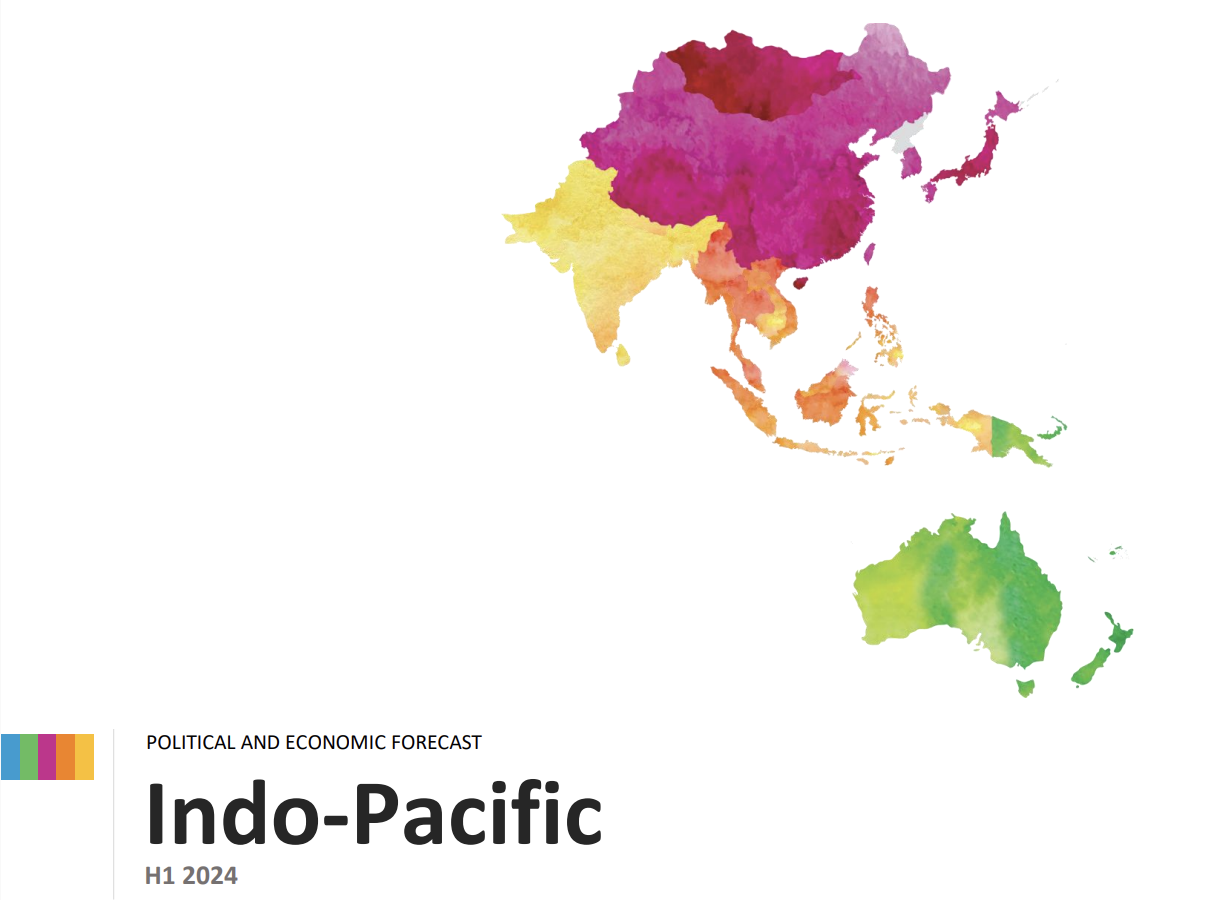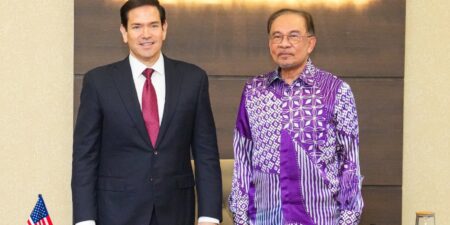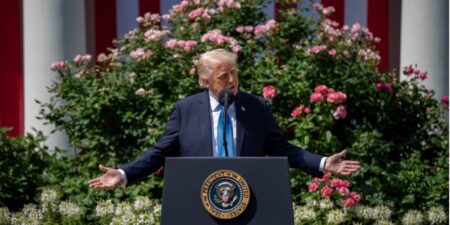
Indo-Pacific Forecast | H1 2024

Below is an introductory letter from BGA President and CEO Ernie Bower on the company’s latest half-yearly regional forecast, circulated to clients and prospects to help inform their planning for the upcoming months.
Dear friends and colleagues,
As we prepare to crack the cover on 2024, the dominant themes of the new year will be accelerating change and resilient economic growth. Asia is dynamic, even messy, but its role as the world’s economic engine remains firm. The region’s role as a business trendsetter and policy bellwether is expanding. What happens in Asia — for instance in such consequential areas as artificial intelligence, payments innovation and especially crypto — increasingly impacts global trends, and we expect that phenomenon to gain momentum as we move further into this century.
This report, which we prepare for clients biannually, is a unique look at the year ahead from BGA’s 228 experts working from the capitals in 27 countries across the Indo-Pacific, tells you what signposts to watch and identifies the themes that will influence business and policy decision-making next year.
As we learned from the pandemic, Russia’s invasion of the Ukraine and recent tragic developments in Israel and Palestine, unpredictable events are a predictable aspect of the landscape. These events will continue to influence Asia, and more of them will take place in 2024.
We recommend watching these hot spots in 2024: civil war and the threat of economic failure loom in Myanmar; elections in a quarter of the countries we cover, including in three of the world’s biggest democracies, India, Indonesia and the United States; governments still taking shape and finding their footing in several countries that had elections last year, such as Malaysia, New Zealand and Thailand; and the China-U.S. relationship continuing in a high-tension state of flux despite good efforts by both governments in the latter part of 2023 to reestablish channels of communication and diplomacy.
Economically, Asia will continue to grow and demonstrate resilience in the face of change. Economies in the Indo-Pacific have largely returned to moderate growth after the pandemic; inflation is slowing, interest rates are easing and energy and food prices have dropped from their highs after accounting for disruptions from the war in Ukraine.
International financial institutions expect the region to grow modestly in the first half of the year, fueled by increased foreign investment in areas such as semiconductors, climate change technologies and digital equipment. China is still struggling to return to pre-pandemic levels of economic growth due to slower domestic and global demand, a real estate crisis and high levels of debt, particularly among local governments. Tourism is sputtering back to life, although the number of travelers to the region from China is still down sharply from levels before COVID-19.
While China searches for economic recovery, India is rising. A new level of energy and increasing trust with the United States augurs well for historic increases in levels of investment and trade, even in what had been more sensitive areas such as high technology, defense and aerospace.
Meanwhile, the leaders of China and the United States met in California earlier this month on the sidelines of the Asia-Pacific Economic Cooperation (APEC) summit and agreed to reopen military lines of communication and explore areas of cooperation and avoid a bifurcation of the global economy, it is clear that domestic politics will limit the impact of such efforts. The U.S. election and China’s internal politics will shift into high gear in 2024 and will limit the scope for genuine progress in stabilizing bilateral ties.
In the geopolitical context of superpower tensions between China and the United States, several key markets are preparing for elections and transitions in the first half of 2024. We are watching upcoming elections in Taiwan, Bangladesh and Pakistan as well as in Indonesia and India. Singapore is preparing for a transition to its fourth generation of leaders in the latter part of the year, and a fierce election campaign is already underway in the United States.
The outlook for many of these elections favor incumbents at this point, but politics can change overnight, and we can expect surprises. To win, incumbents will need to make consequential policy concessions, which will impact business for good and bad, largely depending on the country. We look into the dynamics of each in the attached report.
While new governments will be elected, several governments formed in 2023 will still be finding their way well into 2024. Elections in Thailand in 2023 led to a new ruling coalition, which took a step away from years of military rule and propelled a new prime minister from the private sector to power. Sretta Thavasin has already traveled the globe in search of investment to jump-start his country’s economy and is moving so fast, Thailand’s bureaucrats are struggling to maintain the new pace. This is an area to watch carefully.
New leaders elected in Timor-Leste came to power seeking to resolve a long-standing dispute with Australia over how to develop a potentially lucrative gas field. Cambodia’s new premier received the baton from his father, who had ruled the country for more than 30 years and is pursing measures to modernize the economy and bureaucracy to attract foreign investment in strategic sectors. In New Zealand, a more conservative government was elected for the first time in six years and will likely be more sympathetic to business interests.
In the new uncertain economic environment, many countries from Indonesia to Thailand and Vietnam to Taiwan are exploring new bilateral and multilateral trade agreements. At the APEC summit, officials announced that the 13 members of the Indo-Pacific Economic Framework (IPEF) have largely completed key sections of the agreement, including on supply chains, environment, corruption and labor issues. But the United States abandoned work on the trade pillar in IPEF because of pressure from the U.S. Congress.
Shortly before APEC, Biden traveled to Vietnam to boost relations to a comprehensive strategic partnership, with a focus on building the semiconductor industry in Vietnam. Biden then hosted Indonesian President Joko “Jokowi” Widodo days before APEC; the two leaders elevated bilateral ties to a comprehensive strategic partnership and discussed agreements on critical minerals and ways to enhance environmental cooperation.
Geopolitical tensions remain high across the Taiwan Strait as the island prepares to elect a new president on January 13. Always vigilant, China is conducting military exercises over and around Taiwan in an effort to remind voters relations with the mainland could be less strained if they supported candidates who unequivocally reject independence. China’s coast guard and paramilitary militia vessels have harassed Philippine ships off the Philippine coast much of 2023. Beijing’s actions have pushed Taipei and Manila to seek closer ties with Washington.
By hosting APEC in November, the United States sought again to demonstrate it is an integral player in the Indo-Pacific despite its challenges. The United States has had strong economic growth that reached 4.9 percent in the third quarter, inflation was down below 4 percent for nearly two years and foreign investment has roughly doubled this year to more than $170 billion thanks to the Inflation Reduction Act and the CHIPS and Science Act. Nearly 70 percent of this investment came from Indo-Pacific countries.
Throughout the region, emerging technologies like artificial intelligence (AI) — while disruptive — have the potential to revolutionize economies, enhance performance and improve lives. Competing interests in each market, such as the need to foster growth and innovation while ensuring citizen protections, and the tradeoffs between data sovereignty and interoperability and policy harmonization across different jurisdictions continue to animate policy discussions. These factors have led to a cautiously pragmatic AI regulation and different outcomes in each country, from a forthcoming comprehensive AI law in Korea to targeted regulation in China and a more hands-off approach in Australia, Singapore and Taiwan.
As the economic and political ground in the Indo-Pacific shifts in 2024, it is critical that firms doing business in the region stay in touch with developments in their markets. Private sector, investment-led growth will dominate the landscape across Asia and is recognized by most regional governments as the foundation for sustainable growth.
This biannual forecast was prepared by BGA teams across Indo-Pacific markets. It highlights major trends, challenges and opportunities in each country and identifies regional trends.
Being successful in Asia requires companies to have granular knowledge of people, trends and risks country by country, state by state, province by province and even city by city. BGA’s business model is committed to delivering on that requirement, and it is our honor to partner with you and your colleagues. We look forward to working with you in 2024 and beyond, and we would welcome your feedback and input on this report.

Sincerely,
Ernest Z. Bower, President and CEO, BowerGroupAsia

Ernest Z. Bower
President & CEO

Subscribe to Asia Street
Insights & News


Malaysia Tariff Tracker | July 10, 2025
The BGA Malaysia Team, led by Senior Director Sadiq Noor Azlan, wrote an update to …
 Sadiq Noor Azlan
Sadiq Noor Azlan

Angola Navigates Commodity Dependence and Diversification Challenges
WHAT YOU NEED TO KNOW ON THE HORIZON Angola Market Overview and Forecast Political Climate …
 Mário Almeida
Mário Almeida

Indo-Pacific Recoils From New US Tariff Announcements
The BGA Global Trade and Economics Team, led by Managing Director Nydia Ngiow, wrote an …
 Nydia Ngiow
Nydia Ngiow
At BowerGroupAsia, we are committed to
delivering result-oriented solutions for our clients
We have proven track record of helping the world’s top companies seize opportunities and manage challenges across the dynamic Indo-Pacific region.



















